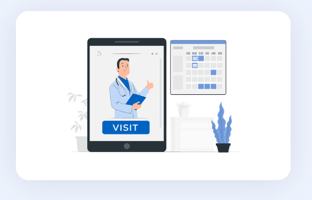Introduction In the dynamic landscape of modern business, the role of a Chief Marketing Officer...
Challenges and Solutions in Hospital Management System Development
Hospital Management Systems (HMS) have become integral components of modern healthcare institutions, streamlining operations, enhancing patient care, and improving overall efficiency. However, the development of an effective HMS is not without its challenges. In this article, we explore some of the key challenges encountered in the development of Hospital Management Systems and provide insights into potential solutions.
Challenges in HMS Development
-
Diverse Stakeholder Needs: Hospitals have a multitude of stakeholders, including healthcare providers, administrative staff, patients, and regulatory bodies. Each group has specific needs and requirements that must be considered during system development.
- Solution: Extensive stakeholder engagement through surveys, interviews, and focus groups can help identify and prioritize user requirements. A user-centered design approach ensures that the system meets the needs of all stakeholders.
-
Interoperability Issues: HMS often need to interface with other healthcare systems, such as Electronic Health Records (EHRs), laboratory systems, and billing platforms. Achieving seamless interoperability can be a complex challenge.
- Solution: Standardized data exchange formats, such as Health Level 7 (HL7), can be implemented to facilitate interoperability. API-based integrations and adherence to industry standards ensure smooth data flow between systems.
-
Data Security and Privacy: Healthcare data is highly sensitive and subject to stringent regulations (e.g., HIPAA in the United States). Protecting patient data from breaches and ensuring compliance with data privacy laws are critical challenges.
- Solution: Robust data encryption, access controls, and audit trails should be implemented to safeguard patient information. Regular security audits and staff training on data security practices are also essential.
-
Scalability: Healthcare institutions can grow rapidly, and the HMS must be scalable to accommodate increasing data volumes, users, and system demands.
- Solution: The system architecture should be designed with scalability in mind, utilizing cloud-based solutions and distributed databases to handle growing data loads. Regular performance testing can help identify scalability issues early.
-
User Adoption: Resistance to change is common when transitioning from paper-based systems to digital HMS. Ensuring user adoption and effective training are crucial.
- Solution: Provide comprehensive training programs for staff and offer ongoing support. Engage users in the system's design and implementation to foster a sense of ownership and commitment to its success.
-
Cost Management: HMS development can be costly, especially for smaller healthcare institutions with limited budgets.
- Solution: Consider open-source HMS solutions as a cost-effective alternative. These systems are customizable and can be tailored to specific needs without the licensing fees associated with commercial software.
Conclusion: Navigating Challenges for Improved Healthcare Management
The develop hospital management system is a complex undertaking, but the rewards in terms of streamlined operations and improved patient care are substantial. By actively addressing the challenges discussed and adopting innovative solutions, healthcare institutions can create robust HMS platforms that meet the unique needs of their organization and enhance their ability to deliver high-quality healthcare services. As technology continues to advance, the development and optimization of Hospital Management Systems will remain crucial in shaping the future of healthcare management.


